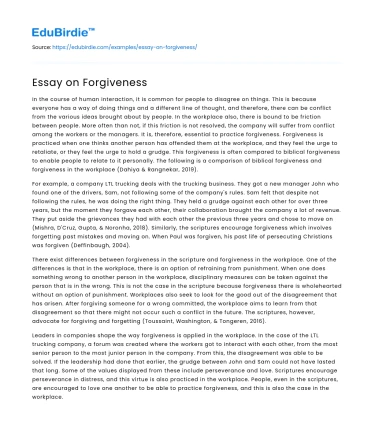In the course of human interaction, it is common for people to disagree on things. This is because everyone has a way of doing things and a different line of thought, and therefore, there can be conflict from the various ideas brought about by people. In the workplace also, there is bound to be friction between people. More often than not, if this friction is not resolved, the company will suffer from conflict among the workers or the managers. It is, therefore, essential to practice forgiveness. Forgiveness is practiced when one thinks another person has offended them at the workplace, and they feel the urge to retaliate, or they feel the urge to hold a grudge. This forgiveness is often compared to biblical forgiveness to enable people to relate to it personally. The following is a comparison of biblical forgiveness and forgiveness in the workplace (Dahiya & Rangnekar, 2019).
For example, a company LTL trucking deals with the trucking business. They got a new manager John who found one of the drivers, Sam, not following some of the company's rules. Sam felt that despite not following the rules, he was doing the right thing. They held a grudge against each other for over three years, but the moment they forgave each other, their collaboration brought the company a lot of revenue. They put aside the grievances they had with each other the previous three years and chose to move on (Mishra, D'Cruz, Gupta, & Noronha, 2018). Similarly, the scriptures encourage forgiveness which involves forgetting past mistakes and moving on. When Paul was forgiven, his past life of persecuting Christians was forgiven (Deffinbaugh, 2004).
Save your time!
We can take care of your essay
- Proper editing and formatting
- Free revision, title page, and bibliography
- Flexible prices and money-back guarantee
There exist differences between forgiveness in the scripture and forgiveness in the workplace. One of the differences is that in the workplace, there is an option of refraining from punishment. When one does something wrong to another person in the workplace, disciplinary measures can be taken against the person that is in the wrong. This is not the case in the scripture because forgiveness there is wholehearted without an option of punishment. Workplaces also seek to look for the good out of the disagreement that has arisen. After forgiving someone for a wrong committed, the workplace aims to learn from that disagreement so that there might not occur such a conflict in the future. The scriptures, however, advocate for forgiving and forgetting (Toussaint, Washington, & Tongeren, 2016).
Leaders in companies shape the way forgiveness is applied in the workplace. In the case of the LTL trucking company, a forum was created where the workers got to interact with each other, from the most senior person to the most junior person in the company. From this, the disagreement was able to be solved. If the leadership had done that earlier, the grudge between John and Sam could not have lasted that long. Some of the values displayed from these include perseverance and love. Scriptures encourage perseverance in distress, and this virtue is also practiced in the workplace. People, even in the scriptures, are encouraged to love one another to be able to practice forgiveness, and this is also the case in the workplace.
In conclusion, forgiveness is a critical pillar in the success of an organization. The productivity of the company can increase when people forgive each other for the wrongs committed. This is seen as a better means rather than exercising disciplinary action, which will bring even more tension between the people in the company leading to even more hate and reducing productivity.
References
- Dahiya, R., & Rangnekar, S. (2019). Linking Forgiveness at Work and Negative Affect. Research Gate, https://doi.org/10.1177/2322093719857348.
- Deffinbaugh, B. (2004, August 13). 14. The Conversion of Saul (Acts 9:1-31). Retrieved from Bible.org: https://bible.org/seriespage/14-conversion-saul-acts-91-31
- Mishra, N., D'Cruz, P., Gupta, P., & Noronha, E. (2018). Forgiveness: A New Dynamic in Workplace Bullying. Research Gate, https://doi.org/ 10.1007/978-981-13-1017-1_3.
- Toussaint, L., Washington, E. L., & Tongeren, D. R. (2016). Forgiveness Working: Forgiveness, Health, and Productivity in the Workplace. Sage Journals, https://doi.org/10.1177/0890117116662312.






 Stuck on your essay?
Stuck on your essay?

